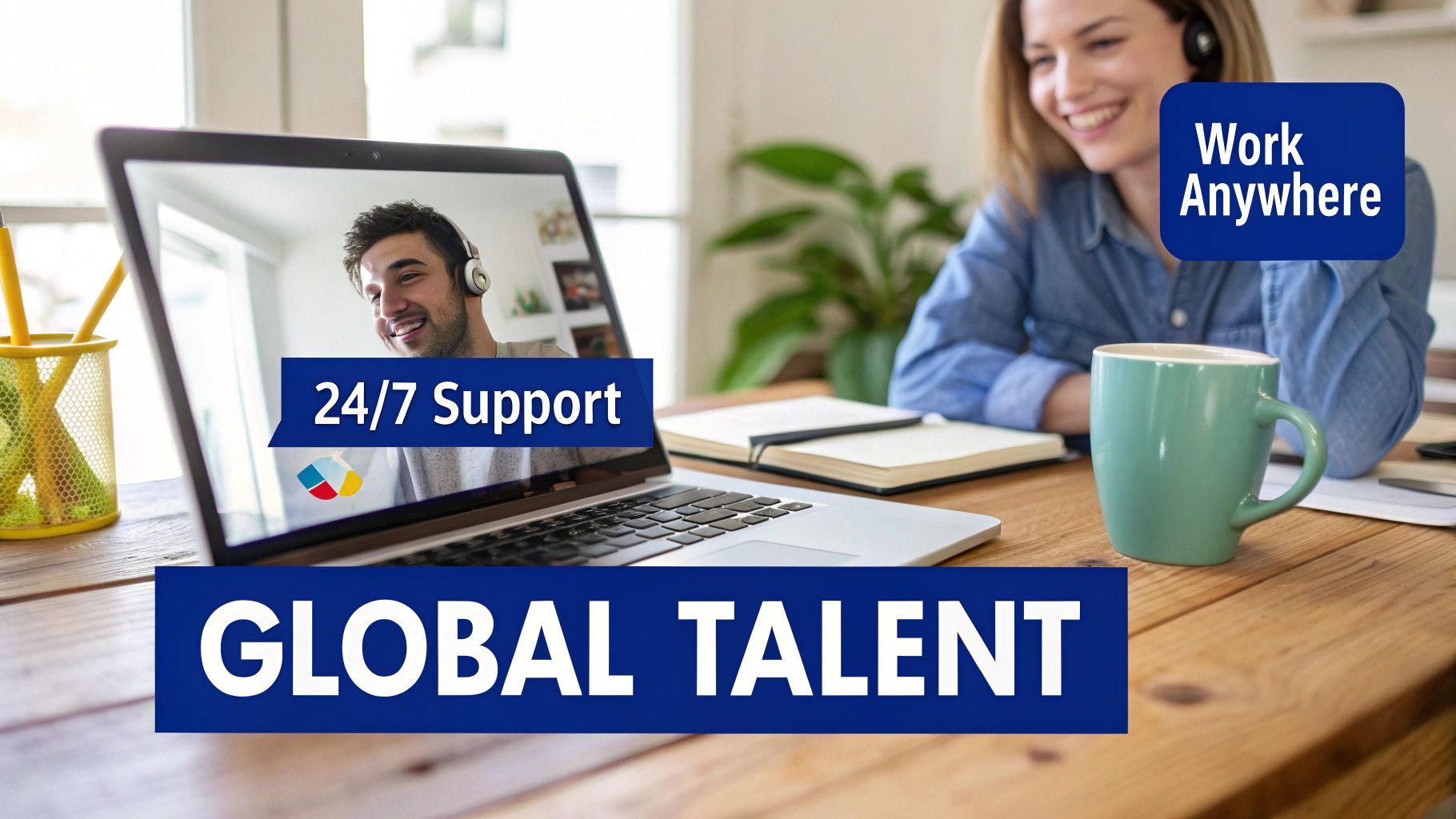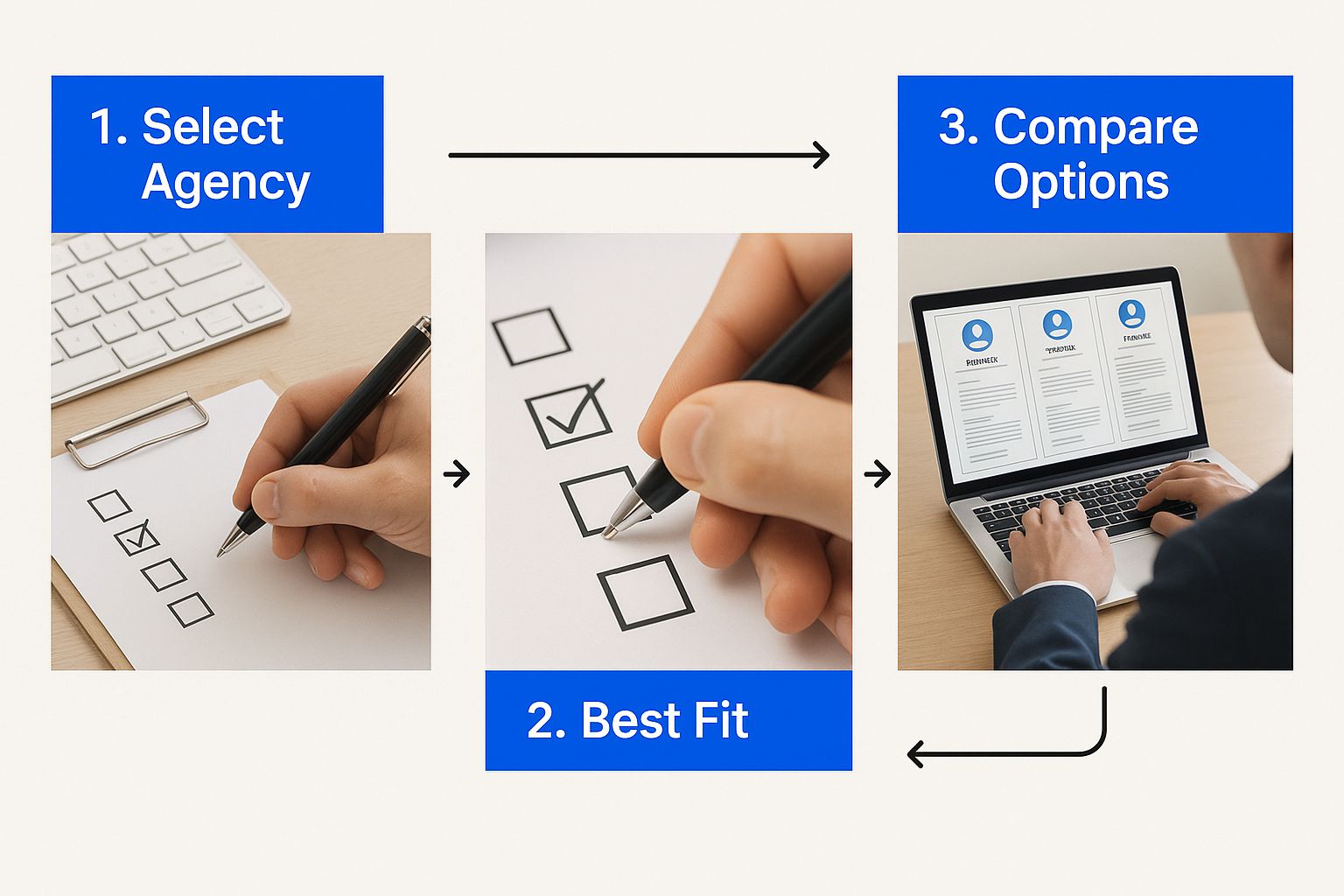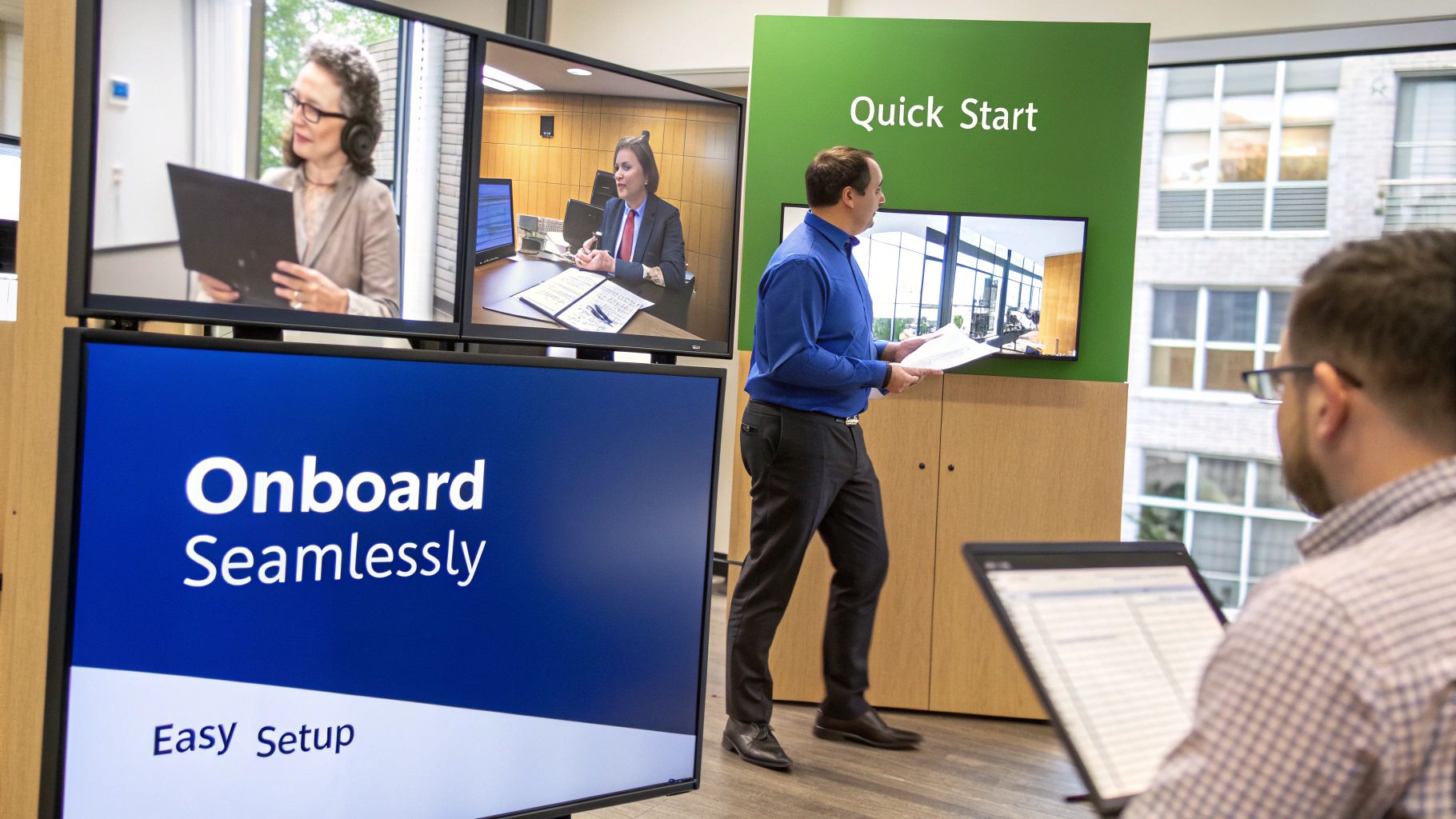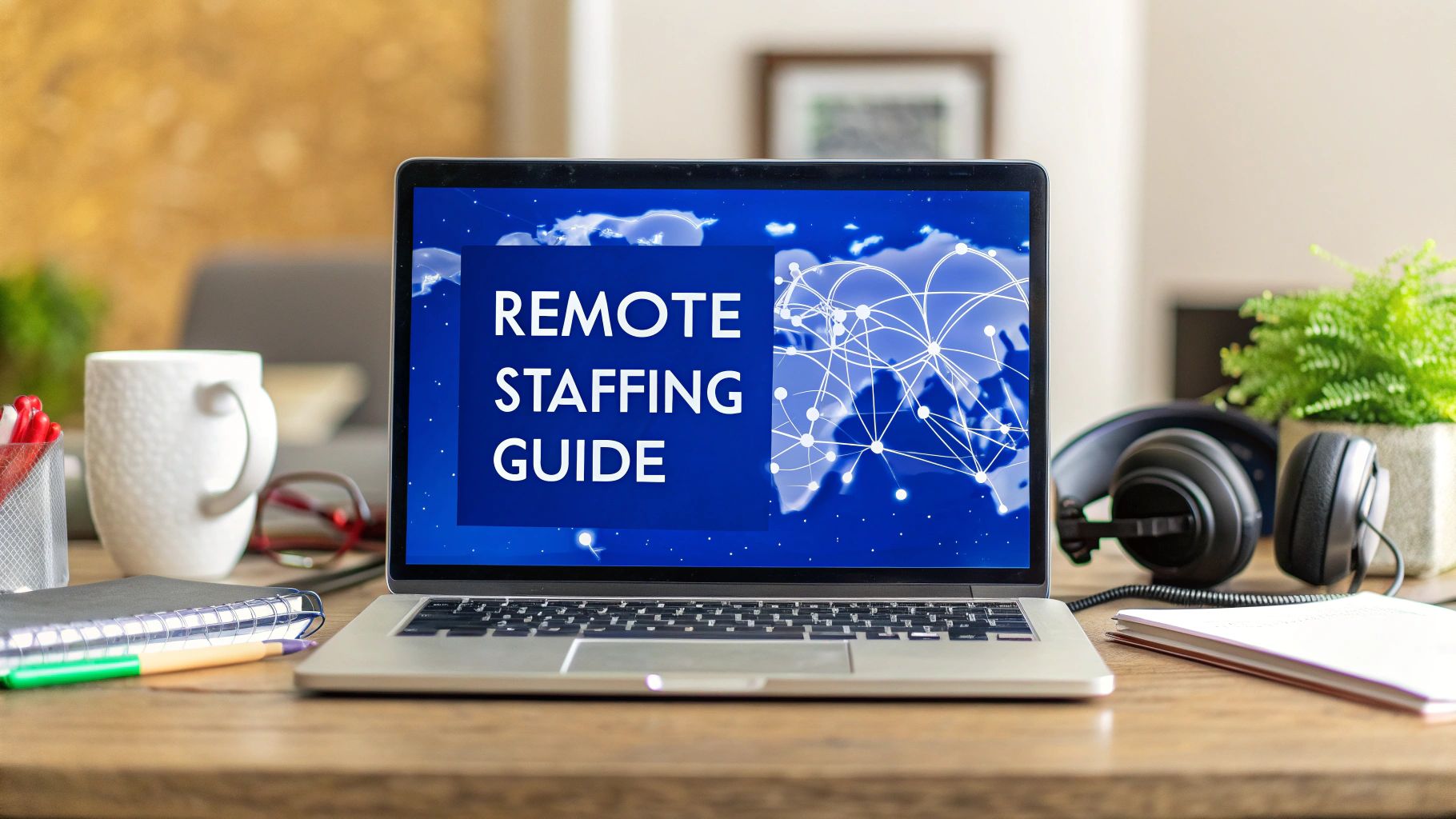So, what exactly is a remote staffing agency? Think of them less like a traditional recruiter and more like a strategic partner dedicated to building your global team. They connect you with skilled professionals from all over the world and then handle the entire backend process – from sourcing and vetting to payroll and international compliance.
Essentially, they act as a bridge to a worldwide talent pool, removing all the usual headaches.
Understanding the Role of a Remote Staffing Agency
At its core, a remote staffing agency is your all-in-one solution for hiring and managing an international workforce. This isn't just about filling a vacancy. Traditional recruiters find a local candidate, collect their fee, and their job is done. A remote staffing agency, on the other hand, becomes a true extension of your own HR department, but with specialised global expertise.
This model has become a game-changer for businesses that need more flexibility, access to niche skills, and a way to stay competitive. The whole point is to take the complexity of international hiring off your plate so you can stay focused on what you do best: running your business.
Beyond Traditional Recruitment
The real difference is in the depth and longevity of the partnership. A remote staffing agency’s involvement doesn't stop once a contract is signed. They stick around to manage the ongoing operational side of things, which can be a massive drain on your internal resources if you try to go it alone.
Here’s a quick look at what they typically handle:
- Global Talent Sourcing: Tapping into professional networks in different countries to find people with the exact skills you need.
- Rigorous Vetting: Putting candidates through their paces with thorough skills tests, background checks, and interviews to make sure they’re not just qualified but also a great cultural fit.
- Compliance and Payroll: Navigating the maze of local labour laws, tax obligations, and salary payments in each employee's home country.
- HR and Administrative Support: Providing ongoing support for your remote team, managing contracts, and administering benefits.
This integrated approach means you get a dedicated, long-term team member, not just a freelancer. It’s a reflection of a massive shift in how modern companies think about growth.
To give you an idea of how much things have changed, consider this: projections show that by 2025, around 63% of UK workers will do at least some of their job remotely. That's a huge leap from just 4.7% before 2020. This trend alone shows why having a partner to navigate the global talent market has gone from a "nice-to-have" to a strategic must-have.
For any business thinking about this route, the first step is to really get to grips with what different remote staffing agencies can offer.
The Core Benefits of Remote Staffing

Working with a remote staffing agency brings some serious advantages to the table, and they go way beyond simple convenience. These benefits can genuinely reshape how your business operates, grows, and competes. Think about it: what if you could build a world-class team without being tied to one location or drowning in overhead costs?
This is exactly what the right partnership unlocks. It’s a strategic move that delivers on three key fronts: significant cost savings, access to a global talent pool, and incredible scalability. When you see how these pieces fit together, you’ll realise this isn't just a trend—it's a foundational business strategy.
Drastically Reduce Operational Costs
One of the first things you'll notice is the impact on your bottom line. Traditional hiring is expensive, and it's not just about salaries. You're paying for office rent, utilities, equipment, and a whole host of other facility-related costs. A remote staffing model wipes most of those expenses right off your budget.
When you partner with an agency, your main cost is the talent, not the desk they sit at. This frees up a huge amount of capital that you can pump back into things that actually grow the business, like marketing, product development, or improving the customer experience. You get the skills you need without the financial drag of physical expansion. To dig deeper into the numbers, check out these key benefits of having remote workers.
Access a Worldwide Talent Pool
Let's be honest, local hiring pools are limited. You're up against every other company in your city, all fighting for the same skilled people. This often leads to paying over the odds or settling for someone who isn't quite the perfect fit. A remote staffing agency shatters those geographical walls.
Suddenly, the whole world is your recruitment ground. You can find highly specialised experts in software development, finance, or digital marketing who are simply not available in your hometown. This is a game-changer, especially for UK businesses grappling with skills shortages.
Projections for 2025 suggest the UK could be facing a 25% skills gap in critical sectors like Information Technology. Remote staffing provides a direct answer, allowing companies to tap into global talent hubs. The bonus? Cost savings can be as high as 40% by ditching the physical overheads. You can find more insights about remote staffing solutions for UK businesses on optimarconsulting.com.
This global reach means you never have to settle. You can hire the absolute best person for the job, no matter where they call home, and build a team that is genuinely top-tier.
Scale Your Business with Agility
Business is never static. One minute you need to scale up for a big project, and the next you might need to dial a team back as priorities change. With traditional employment, this is a slow, expensive, and complicated process.
A remote staffing agency gives you the agility you need to move at the speed of the market. Need to build a ten-person customer support team in two weeks? A good agency can tap into its pre-vetted network and make it happen. When the project wraps up, you can scale back down without the headache of traditional redundancies.
This kind of flexibility allows your business to be incredibly responsive. You can jump on new opportunities without being bogged down by long-term staffing commitments. It's simply a smarter, more dynamic way to manage your most important asset—your people.
How the Remote Staffing Process Works
Working with a remote staffing agency isn't like placing a simple order; it's a partnership. Think of it as a well-oiled process designed to connect you with incredible global talent, all while you get to skip the headaches of international hiring. Knowing how it works from the inside will show you just how much control you retain over the most important decisions.
The entire journey is built around what you need, making sure the person you hire isn't just a great developer or marketer, but a perfect fit for your team's culture. Let’s walk through what you can expect, step by step.
The Initial Consultation and Needs Analysis
It all starts with a conversation. This is where you and the agency get on the same page. You’ll talk through the role you’re looking to fill, covering the essential technical skills, the level of experience needed, and—just as importantly—what your company culture is all about. A good remote staffing agency won’t just take notes; they’ll act as a consultant, asking smart questions to build a really solid profile of your ideal candidate.
This deep dive is critical. It’s the blueprint for the entire search. We're not just creating a job description here; we're defining what a successful hire looks like in your organisation.
The infographic below breaks down the key stages in finding that perfect-fit candidate.

As you can see, choosing the right agency and carefully comparing their vetted candidates are the foundational steps to getting this process right.
Talent Sourcing and Rigorous Vetting
Once your requirements are crystal clear, the agency gets to work, tapping into its extensive global network. They handle all the heavy lifting—sourcing candidates who tick every box on your list. But this goes far beyond just sifting through a pile of CVs. It involves a serious, multi-stage vetting process built to find the absolute best.
The best agencies don't stop at technical tests. They conduct deep-dive interviews, verify qualifications, and run thorough background checks to make sure every single person they put forward is a top-tier professional ready to make an impact immediately.
This vetting process usually includes:
- Skills Assessment: Candidates are put through their paces with tests that confirm their technical skills and real-world expertise.
- Cultural Fit Evaluation: The agency holds interviews to get a feel for a candidate’s personality, how they communicate, and whether their values align with yours.
- Reference and Background Checks: They do the due diligence, verifying past employment and speaking to references to confirm a candidate’s professional history and reputation.
Your Role in Interviews and Final Selection
After all that intensive screening, the agency hands you a shortlist of the very best candidates—usually just two or three finalists. Now, it’s your turn to step back in and take the lead. You’ll conduct the final interviews, giving you the chance to personally meet each candidate and decide who truly clicks with you and your team.
The agency handles all the logistics, like coordinating interview times across different time zones, and makes sure you have all the background info you need. But at the end of the day, the final say is always yours. You get all the benefits of a global, expert-led search without ever giving up control over who you bring on board. It’s a collaborative approach that ensures you end up with a team member you can trust, backed by a process that guarantees quality from the start.
How to Choose the Right Staffing Partner

Picking a remote staffing agency is a huge decision. Get it right, and they become a genuine extension of your team, driving your success. Get it wrong, and you're left with wasted time, frustration, and hires who just don't click. You have to look past the shiny brochures and get to the heart of how they actually work.
Your mission is to find an agency that does more than just fill an empty chair. You need a partner who truly gets your company's mission, its culture, and the kind of people who thrive there. This means doing your homework and evaluating them on their expertise, their process, and the support they offer after the hire. Think of it less like hiring a vendor and more like bringing on a strategic business partner.
Evaluate Industry and Role Specialisation
Let's be clear: not all staffing agencies are the same. Some are generalists, casting a wide net across every industry under the sun. Others are specialists, with deep, hard-won expertise in specific fields like tech, finance, or marketing. In my experience, you’re almost always better off with a specialist.
Why? Because a specialist agency already speaks your language. They understand the subtle but critical differences between a front-end and back-end developer, or what makes a truly great financial analyst. This niche knowledge means they can screen candidates far more effectively, bringing you higher-quality talent right from the start.
Choosing an agency with a proven track record in your industry means they already have a network of pre-vetted professionals. This dramatically shortens the hiring timeline and increases the likelihood of finding a perfect match who can make an impact from day one.
Before you even think about signing a contract, ask for case studies. Request to speak with current clients in a similar industry. Their real-world experience is the best proof of an agency's ability to deliver.
Scrutinise the Vetting and Screening Process
An agency's real value is revealed in its vetting process. A quick glance at a CV and a brief phone call is a massive red flag. You're looking for a partner who digs deep to ensure a candidate isn't just technically capable but is also a perfect cultural fit for your team.
A top-tier vetting process will always include a few key stages:
- Technical Skills Assessments: This goes beyond what’s on paper. Candidates should face practical tests and hands-on challenges to prove they have the skills needed for the job.
- Soft Skill Evaluation: In a remote setting, things like communication, self-motivation, and problem-solving are non-negotiable. The agency must have a clear method for assessing these crucial traits.
- Cultural Alignment Interviews: This is where the magic happens. The agency needs to understand your company's values and work style to find someone who will blend in seamlessly.
The depth of this process is directly tied to the quality of your hire and how long they'll stay with you. A great agency will be completely transparent about how they screen candidates. They should be proud of their methodology. You can get a better sense of what to look for by reviewing some proven remote hiring strategies that the best agencies use.
Assess Ongoing Support and Communication
The work isn't over once the employment contract is signed. The best remote staffing partners stick around to make sure everything runs smoothly long after the hire is made.
You need to ask what their support looks like after day one. Will they help with onboarding? What's the process if performance issues come up? A truly committed agency stays in the loop, acting as a bridge for communication and handling the nitty-gritty HR and admin tasks. This frees you up to do what you do best: lead your team and grow your business. That continued partnership is what separates a good agency from a great one.
Choosing the right partner requires asking the right questions. We've put together a quick checklist to guide your conversations and help you identify an agency that truly aligns with your needs.
Key Questions to Ask a Potential Agency
Using these questions as a starting point will give you a much clearer picture of who you’re dealing with. It helps you move beyond the sales pitch to understand an agency's processes, values, and commitment to being a long-term partner in your success.
Integrating Remote Staff for Long-Term Success
So, you’ve hired a brilliant remote professional through a staffing agency. That’s a huge win, but the work doesn’t stop once the contract is signed. The real magic happens during the integration phase. If you want to unlock long-term productivity and loyalty, you have to make your new team member feel like they truly belong from day one.
This is about more than just sending a few welcome emails. It’s about consciously building a connected, supportive environment where distance doesn't matter. When you get this right, you create a genuinely cohesive team where everyone, regardless of their location, is fired up to do their best work.
Building a Foundation of Clear Communication
For any remote team, strong communication is the glue that holds everything together. You don’t have those spontaneous office chats or coffee machine catch-ups, so you have to be deliberate in creating opportunities for connection, both formal and informal. It all starts with having the right toolkit.
Tools like Slack and Zoom are absolute must-haves for daily check-ins and project collaboration. But the tech is only one piece of the puzzle. The real secret to success lies in knowing how to improve team communication in a remote setting. By setting clear ground rules—like core working hours and expected response times—you can easily manage different time zones and keep the whole team in sync.
This kind of structure heads off misunderstandings at the pass and ensures nobody feels left out or isolated, no matter where they’re logging in from.
Fostering an Inclusive and Connected Culture
Your company culture shouldn't be limited to the four walls of an office; it needs to reach every single person on your team. When you bring remote staff on board, you have to get creative to build personal connections and a real sense of shared purpose. This is where virtual team-building really shines.
Think about organising activities that genuinely help people connect:
- Virtual Coffee Breaks: Short, informal video calls where work talk is strictly banned.
- Online Team Games: A bit of fun and friendly competition can spark collaboration and a few laughs.
- Shared Interest Channels: Create dedicated spaces on Slack for hobbies like books, films, or fitness.
These small touches make a world of difference. They help your remote staff build real relationships with their colleagues and show them they're valued as people, not just for their work. With around 40% of the UK workforce expected to work remotely in some form in 2025, getting this right is no longer a "nice-to-have"—it's a competitive advantage.
A successful remote team isn't just a group of individuals working in isolation. It's a connected, collaborative unit built on trust, clear communication, and a shared commitment to common goals.
Finally, don't forget about clear performance metrics. When people know exactly what success looks like and how their work fits into the company’s bigger picture, they feel far more engaged. Regular one-to-one meetings are perfect for discussing progress, tackling challenges, and reminding them how crucial their role is. This kind of hands-on approach ensures every single team member, whether they're down the hall or across the globe, feels supported and valued.
Common Questions About Remote Staffing
Thinking about bringing a remote staffing agency on board is a big step, and it’s completely normal to have a few questions swirling around. Most people worry about things like tricky international laws, surprise costs, and keeping company data safe. The good news is, a solid agency is specifically designed to handle all of that for you.
Let's walk through some of the most common questions we hear from businesses. Getting clear answers will help demystify the whole thing and show you how a great partner has your back.
How Is Legal and Tax Compliance Handled?
Trying to figure out international employment law is a massive headache. It's probably one of the biggest things that stops companies from hiring talent in other countries. This is where a professional remote staffing agency really shines, because they step in as an Employer of Record (EOR).
You can think of the EOR as your all-in-one international HR and legal team.
They become the official, legal employer of your team member in their own country. That means the agency takes on full responsibility for:
- Following all local labour laws, covering everything from contracts to termination rules.
- Running payroll and making sure the right income taxes are withheld.
- Managing social security payments and any other required contributions.
By acting as the EOR, the agency takes on all the legal and financial risk. This saves you from the nightmare of navigating cross-border compliance yourself and means you can sleep at night knowing everything is being handled correctly.
Ultimately, this setup lets you get a fantastic, dedicated team member without needing to establish a legal company in another country.
What Is the Typical Cost Structure?
When you're building a remote team, you need financial predictability, not a bill full of surprises. That’s why the best agencies use a simple, all-inclusive monthly fee. It’s designed to be completely transparent so you can budget with confidence.
That single monthly payment covers everything you need to think about:
- The employee's full salary, which is always paid on time and in their local currency.
- The agency's service charge, which is their fee for handling all the operational heavy lifting—HR, payroll, compliance, and even IT support.
You won't see separate charges for recruitment, onboarding, or other admin tasks. You just get one straightforward invoice that bundles all the costs into one number. It’s a clean approach that lets you focus on leading your new team member, not drowning in their paperwork.
How Do You Ensure Data Security?
Let's face it, your company's data is one of your most critical assets, so security isn't something you can compromise on. Any agency worth its salt makes protecting your confidential information its number one priority. They achieve this with a security strategy that has several layers of protection.
First off, strong security measures are just part of the package. This includes things like secure IT systems, encrypted communication tools, and making sure every remote professional is working on a secure network from day one.
Beyond the tech, legally binding agreements are key. Every single team member has to sign a detailed non-disclosure agreement (NDA) before they start any work. On top of that, these agencies make sure they're fully compliant with major data protection laws like GDPR, giving you that extra layer of assurance and complete peace of mind.

